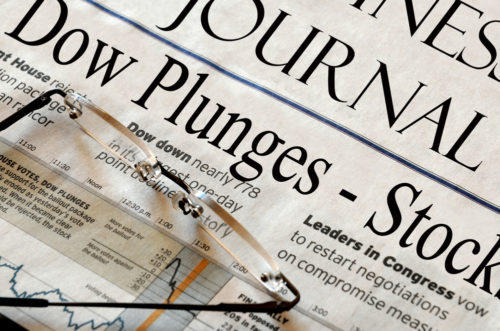The 2008 financial crisis was the greatest economic collapse since the Great Depression, and sent economies all over the world tumbling. While some time has passed since the Great Recession of 2008, its effects still linger in the lives of everyday Americans. People of all different ages were affected by the crisis, losing their jobs, savings, and even their homes.
The seeds of the financial crisis began during the subprime mortgage bubble in the mid-2000s. During this time, many lenders offered mortgages to borrowers with poor credit and inadequate savings. While more people than ever before could now afford to buy homes, the loans they were offered often came with high interest rates and variable payment schedules that punished borrowers in the long run. Banks and lenders sold these mortgages to institutional investors, with the result that a sizable portion of the financial industry gambled on subprime mortgages.
As long as the housing market continued to grow, these homes would appreciate in value, and homeowners could always sell their property for a profit if it became difficult to pay their mortgages. Once the housing market collapsed, however, huge swaths of people were suddenly unable to sell their houses or pay their mortgages. Economists warned that the subprime mortgage bubble could not last forever, and that it was dangerous for the economy to rely so heavily on an ever-increasing housing market.
In the spring of 2007, more and more people began to default on their mortgages because they were unable to pay. By the fall of 2008, this triggered an economic collapse that was felt around the globe. Many financial companies were in crisis, including the Federal National Mortgage Association (Fannie Mae) and the Federal Home Loan Mortgage Corporation (Freddie Mac). Lehman Brothers, a financial investment firm that had speculated heavily on subprime mortgages, filed for bankruptcy in the largest such filing to date at that time.
The collapse of the housing bubble began one of the worst financial crises since the Great Depression. Many people lost their jobs or had their homes foreclosed. Others lost a large fraction of their investments in the stock market, with retirement savings particularly hard hit. Young people who graduated into the recession found it difficult to find work, and were often set back several years in terms of their financial and professional progress.
While the economy has recovered since the Great Recession, its effects are still being felt today. Many Americans still haven’t yet recouped the money they lost in the crash. Inequality between the rich and the poor is increasing, with much of the economic growth of the past decade primarily benefiting extremely high earners. Ultimately, the 2008 financial crisis has had far-reaching effects up to and including the present day; for their part, baby boomers are still feeling these effects.
Table of Contents
The Baby Boomer Generation
While the baby boomer generation, which includes people born from 1946 to 1964, did not suffer as many adverse consequences during the Great Recession as some other generations, they were still hit hard. In particular, many baby boomers saw their retirement investments plummet when the markets crashed in 2008. The recession also impacted lower-income baby boomers who may not have had a financial cushion with which to ride out the storm.
Because of their age and prominent positions of power in the government and major financial firms during the 2000s, the baby boomer generation is sometimes thought to have “caused” the Great Recession. Inspired by a myth of continual growth, members of this generation made unwise financial choices that directly contributed to the burst of the housing bubble and the collapse of the stock market in 2008.
Not all baby boomers contributed to the crash. Those already marginalized by race or class were not culprits. The fault-lines lie at the division of classes more than they do the division of generations. Many politicians and executives from the highest echelons of society played a direct role in ushering in the 2008 financial crisis.
Baby Boomer Unemployment Rates
During the Great Recession, long-term spells of unemployment were highest for baby boomers, according to the Atlantic. Many people of this generation were nearing retirement age, and found it difficult to find a new job after being laid off during the recession.
Baby Boomers vs. Gen X
While baby boomers remained unemployed the longest during the recession, Gen X was more likely to lose and fail to regain stable, middle-class jobs. Less financially secure older workers were more severely affected than baby boomers who had saved up a financial cushion.
Baby Boomers vs. Millennials
Overall, young people of the millennial generation faced slightly lower rates of unemployment during the Great Recession. However, the 2008 financial crisis arguably hit millennials the hardest, with many unable to find adequately compensated work if they were able to find a job at all. According to the Atlantic, joblessness was two to three times higher for young people than for older workers. While many baby boomers already had years of work experience and savings behind them, the recession permanently stunted millennials’ professional and financial growth.
Baby Boomer Income
Baby boomers’ incomes took a hit during the recession, but have largely recovered since then. According to the Atlantic, as of 2019, older adults have the lowest unemployment rate and the highest income of any generation.
Baby Boomers vs. Gen X
While baby boomers were able to benefit from the economic growth of the latter half of the 20th century, Gen X is generally in a more precarious financial position. As the Atlantic reports, Gen X makes less than they did 30 years ago when adjusted for inflation, and they often find it difficult to advance professionally with baby boomers still hanging on to upper-level positions.
Baby Boomers vs. Millennials
While economic recessions and depressions affect all ages, they often have a permanent financial impact on young people who come of age during a financial crisis. According to the Atlantic, young people who graduated into a recession still earn 10% less than normal over a decade later. Overall, millennials’ incomes were much harder hit than baby boomers’.
Baby Boomers Housing
Those baby boomers who already owned their homes were much better able to weather the Great Recession. For those who had been lured into homeownership with subprime mortgages, however, the consequences were often severe. Many people lost their homes to foreclosure, losing both a place to live as well as one of their major assets.
More than a decade after the recession, many baby boomers struggle to find adequate housing as they approach retirement age. Older Americans are anxious that they won’t be able to maintain their standard of living, and worry that they will spend their last years in poverty. In many areas, a lack of affordable, accessible housing is one of the main factors contributing to this issue.
Baby Boomers Retirement
In many respects, the Great Recession hit baby boomers the hardest in terms of their retirement savings. According to Reuters, 66% of Americans are worried about not having enough money saved up to retire. Because of their age, baby boomers also have the least amount of time to recoup their investment losses before they need to access those funds. While millennial and Gen X investments might continue to mature over time, baby boomers’ retirement savings will need to be used in the near future.
As Reuters reports, the baby boomer generation may be the first generation since the Great Depression of the 1930s who will be worse off than previous generations during retirement. As with many other effects of the financial crisis, this is largely determined by race and class, with many wealthy, white Americans able to maintain their standard of living much more easily than other, less fortunate older Americans.
Did Baby Boomers Cause the Financial Crisis?
While it’s tough to assign blame for a worldwide economic collapse to any one group of people, many blame the baby boomers for the 2008 financial crisis. Because of their age and position in society at the time of the crash, baby boomers made up the vast majority of politicians and executives responsible for the events that led directly to the crash. Baby boomers are sometimes accused of reaping the benefits of the financial prosperity of the 20th century and leaving little behind for generations to come. Financial inequality, environmental pollution, and excessive consumerism are all also commonly pinned on baby boomers.
The baby boomer generation represented many unchecked assumptions about America that have since been called into question, including the idea that unregulated financial growth is an unmitigated good, that a successful economy will benefit all Americans, not just a privileged few, and that there are more benefits than risks to financial speculation. Maturing during the unprecedented growth and economic development following the second world war, the baby boomer generation was uniquely positioned to harbor ideas about economic prosperity that no longer matched up with reality.
While the world economies have in many respects recovered from the Great Recession, its effects still linger. As the baby boomers pass along the reigns to new generations, it will be up to Gen X, millennials, and zoomers to create a world in which sensible regulation protects the economy and the environment, and in which average Americans are insulated from the effects of future financial meltdowns.
Image Source: https://depositphotos.com/





